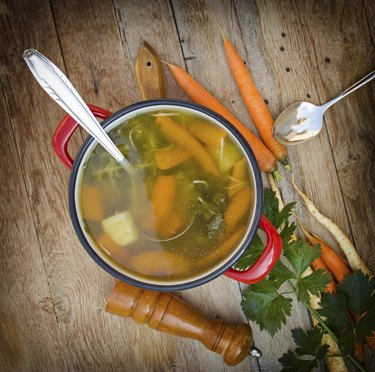
If you have completed a medically supervised liquid diet, you will have specific guidelines about how to resume eating solid foods. This is especially true if you have any medical issues, so follow your doctor's advice. If you have designed your own liquid diet and want to get back to eating, proceed with caution. Always consult your physician or other appropriate health professional if you feel weak or ill after your liquid fast.
Ayurvedic Diet
Video of the Day
In Ayurvedic medicine that originates from India, panchakarma is a special detoxification regimen. During that time, kitchari, which is made from well-cooked rice and mung bean, is eaten for several days. Vasant Lad, author of the "The Complete Guide to Ayurvedic Home Remedies," recommends eating this with ghee, or butter with milk fat removed. This is generally appropriate for most people ending a liquid diet. Consider eating a half-cup portion to start, two or three times a day as you are able to digest. Resist the temptation to eat heavy animal protein, fried, spicy, oily or sugary foods. These can overwhelm your digestion coming off a liquid diet.
Video of the Day
Gradual Reintroduction of Solids
Elson Haas, MD, has led several juicing groups in Marin County, Calif., and advised them to gradually reintroduce solid foods. Eating vegetable broth, well-cooked grains such as oatmeal, brown rice, millet, quinoa or basmati with small amounts of steamed vegetables and very small amounts of olive, flax or canola oil are usually well-tolerated, he writes in "The New Detox Diet." He also recommends small amounts of cooked legumes of all types: lentils, mung beans, navy beans and the like. These provide easy-to-digest protein if they are cooked well until very soft.
Bland Foods
After a liquid diet, it is generally most difficult to digest raw vegetables such as broccoli that require the stomach produce to a large amount of hydrochloric acid. Instead, consuming a bland diet such as rice congee with a small amount of cooked vegetables such as green, black or purple kale, or collard greens is generally easy to digest. Andrew Weil, MD, advises people to start with whole fruit, eat lightly, chew slowly and thoroughly and to skip eating a huge feast to avoid feeling sick.